(精品)中考英语词汇话题联想记忆 第30讲 Some famous persons in the history of China学案
2015人教版九年级英语unit3单词联想记忆
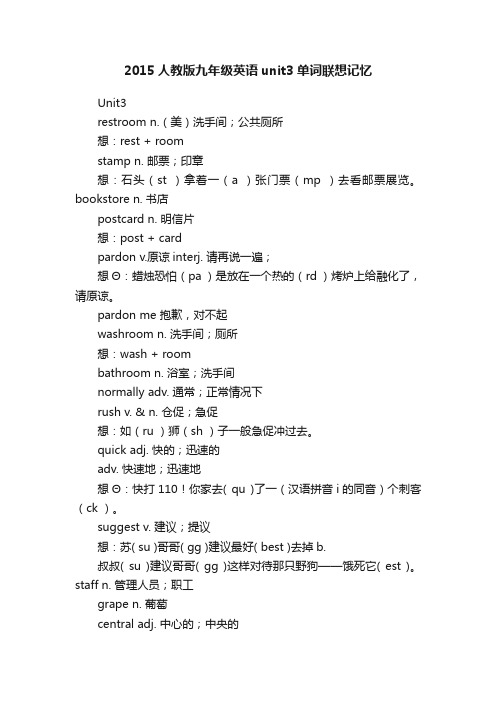
2015人教版九年级英语unit3单词联想记忆Unit3restroom n.(美)洗手间;公共厕所想:rest + roomstamp n. 邮票;印章想:石头(st )拿着一(a )张门票(mp )去看邮票展览。
bookstore n. 书店postcard n. 明信片想:post + cardpardon v.原谅interj. 请再说一遍;想Θ:蜡烛恐怕(pa )是放在一个热的(rd )烤炉上给融化了,请原谅。
pardon me 抱歉,对不起washroom n. 洗手间;厕所想:wash + roombathroom n. 浴室;洗手间normally adv. 通常;正常情况下rush v. & n. 仓促;急促想:如(ru )狮(sh )子一般急促冲过去。
quick adj. 快的;迅速的adv. 快速地;迅速地想Θ:快打110!你家去( qu )了一(汉语拼音i的同音)个刺客(ck )。
suggest v. 建议;提议想:苏( su )哥哥( gg )建议最好( best )去掉b.叔叔( su )建议哥哥( gg )这样对待那只野狗——饿死它( est )。
staff n. 管理人员;职工grape n. 葡萄central adj. 中心的;中央的想Θ:分币( cent )上印着一个人( r )拿了一( a )根棍子( l )。
mail v. 邮寄;发电子邮件n. 邮件;信件east adj. 东方的;东部的adv. 向东;朝东n. 东;东方fascinating adj.迷人的;极有吸引力的想:快点( fas —fast 的近似拼写)吃( ci ),我们要去捉那( na )只迷人的蜻蜓( ting )了。
inexpensive adj. 不昂贵的uncrowded adj. 不拥挤的;人少的convenient adj.便利的;方便的想Θ:看( con ),五( v )只鹅( e )在笑看泥( ni )里的蚂蚁( ent —ant 的近似拼写)是多么的不方便。
人教版八年级上册英语第三单元重点知识总结
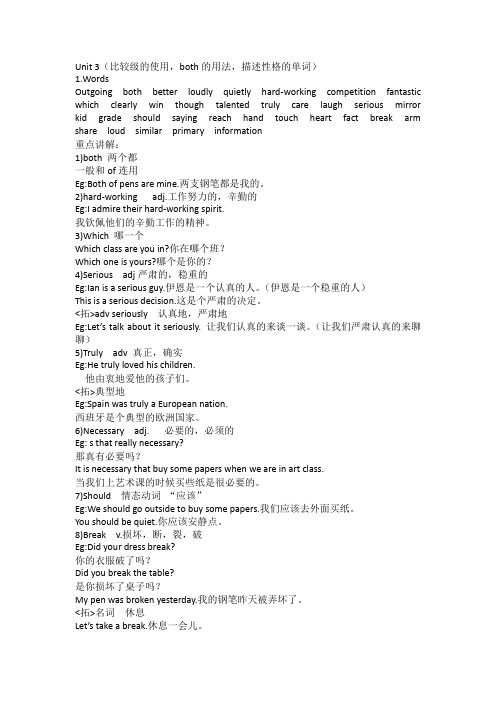
Unit 3(比较级的使用,both的用法,描述性格的单词)1.WordsOutgoing both better loudly quietly hard-working competition fantastic which clearly win though talented truly care laugh serious mirror kid grade should saying reach hand touch heart fact break arm share loud similar primary information重点讲解:1)both 两个都一般和of连用Eg:Both of pens are mine.两支钢笔都是我的。
2)hard-working adj.工作努力的,辛勤的Eg:I admire their hard-working spirit.我钦佩他们的辛勤工作的精神。
3)Which 哪一个Which class are you in?你在哪个班?Which one is yours?哪个是你的?4)Serious adj严肃的,稳重的Eg:Ian is a serious guy.伊恩是一个认真的人。
(伊恩是一个稳重的人)This is a serious decision.这是个严肃的决定。
<拓>adv seriously 认真地,严肃地Eg:Let’s talk about it seriously. 让我们认真的来谈一谈。
(让我们严肃认真的来聊聊)5)Truly adv 真正,确实Eg:He truly loved his children.他由衷地爱他的孩子们。
<拓>典型地Eg:Spain was truly a European nation.西班牙是个典型的欧洲国家。
6)Necessary adj. 必要的,必须的Eg: s that really necessary?那真有必要吗?It is necessary that buy some papers when we are in art class.当我们上艺术课的时候买些纸是很必要的。
人教版八年级上册英语 Unit 3 词汇和语法基础(解析版)
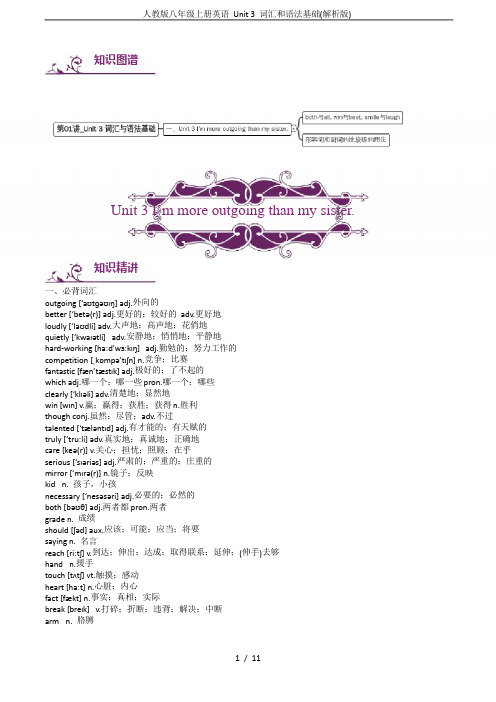
知识图谱Unit3I’m more outgoing than my sister.知识精讲一、必背词汇outgoing[‘aʊtɡəʊɪŋ]adj.外向的better[‘betə(r)]adj.更好的;较好的adv.更好地loudly[‘laʊdli]adv.大声地;高声地;花俏地quietly[‘kwaɪətli]adv.安静地;悄悄地;平静地hard-working[haːd’wɜːkɪŋ]adj.勤勉的;努力工作的competition[ˌkɒmpə’tɪʃn]n.竞争;比赛fantastic[fæn’tæstɪk]adj.极好的;了不起的which adj.哪一个;哪一些pron.哪一个;哪些clearly[‘klɪəli]adv.清楚地;显然地win[wɪn]v.赢;赢得;获胜;获得n.胜利though conj.虽然;尽管;adv.不过talented[‘tæləntɪd]adj.有才能的;有天赋的truly[‘truːli]adv.真实地;真诚地;正确地care[keə(r)]v.关心;担忧;照顾;在乎serious[‘sɪəriəs]adj.严肃的;严重的;庄重的mirror[‘mɪrə(r)]n.镜子;反映kid n.孩子,小孩necessary[‘nesəsəri]adj.必要的;必然的both[bəʊθ]adj.两者都pron.两者grade n.成绩should[ʃəd]aux.应该;可能;应当;将要saying n.名言reach[riːtʃ]v.到达;伸出;达成;取得联系;延伸;(伸手)去够hand n.援手touch[tʌtʃ]vt.触摸;感动heart[haːt]n.心脏;内心fact[fækt]n.事实;真相;实际break[breɪk]v.打碎;折断;违背;解决;中断arm n.胳膊laugh[laːf]v.发笑;笑;嘲笑n.笑声;笑;笑料share[ʃeə(r)]vt.分享,共享;分配;共有loud[laʊd]adj.大声的;adv.大声地;响亮地similar[‘sɪmələ(r)]adj.类似的primary[‘praɪməri]adj.最初的,最早的information[ˌɪnfə’meɪʃn]n.信息;情报;资料;通知二、重点词汇petition noun/ˌkɒm.pəˈtɪʃ.ən/a situation in which someone is trying to win something or be more successful than someone else竞争1).Competition for jobs is intense.求职的竞争非常激烈。
人教版英语九年级第三单元知识点梳理
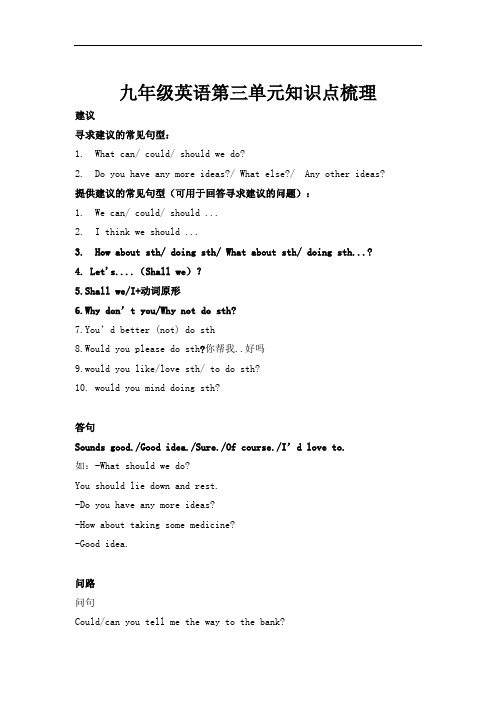
九年级英语第三单元知识点梳理建议寻求建议的常见句型:1. What can/ could/ should we do?2. Do you have any more ideas?/ What else?/ Any other ideas? 提供建议的常见句型(可用于回答寻求建议的问题):1. We can/ could/ should ...2. I think we should ...3. How about sth/ doing sth/ What about sth/ doing sth...?4. Let's....(Shall we)?5.Shall we/I+动词原形6.Why don’t you/Why not do sth?7.You’d better (not) do sth8.Would you please do sth?你帮我..好吗9.would you like/love sth/ to do sth?10. would you mind doing sth?答句S ounds good./Good idea./Sure./Of course./I’d love to.如:-What should we do?You should lie down and rest.-Do you have any more ideas?-How about taking some medicine?-Good idea.问路问句Could/can you tell me the way to the bank?Could/can you tell me how to get to the bank?May I ask the way to the bank?May I ask how to get to the bank?Do you know the bank is ?Excuse me, how can I get to the bank?Excuse me, where is the bank?Excuse me, is there a bank around here?答句Turn left/right(at the first crossing)(在第一个路口)左转/右转。
六年级英语上册知识梳理- Unit 6 Famous People Part A-人教新起点

一、学习目标1. 知识目标:(1)能够听说读写与职业有关的词汇:actor , artist, scientist, writer, musician, inventor. 与国籍有关的词汇:Chinese, Danish, English, American, German(2)能够听说读写与谈论名人生平有关的用语:This is…He was a /an … He was born in …2. 能力目标:(1)能够借助图片、关键词等信息,听懂有关某著名人物生平及其成就的简短语篇。
(2)能够运用本讲重点句型与他人简单谈论自己崇拜或喜爱的名人的生平、成就等情况。
二、重点、难点1. 由look组成的短语2. try to do sth. 与try doing sth.的区别3. at the age of的含义及用法4. 句型:He was an actor. He was born in…知识梳理一、单词领读:家actor 演员n. Chinese 中国人n. musician 音乐家n. German 德国人n. writer 作家n. Danish 丹麦人n. scientist 科学家n. English 英格兰(国)人n. inventor 发明家n. American 美国人n.二、重点单词【单词学习】1. actor【音标】【用法】n. 行动, 行为, 幕vi. 行动, 表演, 假装, 表现actvt. 扮演, 装作词汇记忆法:act—actor—actress—action—active—activity【例句】I want to be an actor in the future.将来我想做一名演员。
He acted his part well. 他扮演那个角色很成功。
I’m hoping that I shall like the second act.我希望我会喜欢第二幕。
最新2019年福建省中考英语总复习---九年级下册-Units-5~6教学讲义PPT课件

考点七 unless的用法 【课文原句】 unless 除非 (九下P53) unless“除非;如果不”,引导条件状语从句,相当于 if...not;当主句是一般将来时时,从句用一般现在时。 You will be late unless you go there by bus.=You will be late if you don't go there by bus. 如果你不乘公共汽车去那里,你会迟到的。
(2)【辨析】 expect, wish, hope
选择填空 3.(2018·天津南开二模改编)Linda is busy working every day. She expects some time to herself on weekends. A.had B.having C.to have
选择填空
6.(2018·新疆乌鲁木齐中考改编)My bike is broken.
I will have it A.fix up B.fixed up C.repairing
tomorrow morning.
考点六 promise的用法 【课文原句】 Kangkang doesn't like to write, so Maria asks him to promise to write emails to them. 康康不喜欢写字,所以玛利亚要求他承诺给他们写 电子邮件。(九下P50)
4.(2018·江西宜春4月模拟)—Has John done the dishes yet? —You cannot him to do such a thing. A.expect C.hope D.wish
考点三 suppose的用法 【课文原句】 Suppose you are a tourist guide and your group members are tourists from America who are very interested in the history of the Great Wall. 假设你是一名导游,你的队员是从美国来的游客, 对长城的历史非常感兴趣。(九下P6)
Unit 3 单元知识速记-2024-2025学年八年级上册英语核心知识归纳精练一遍过(人教新目标)

Unit 3 单元知识速记词汇精讲1. both(1) 代词,意为“两者,双方,两人”。
例如:Both of the flowers are very beautiful. = The flowers are both very beautiful.这两朵花都很漂亮。
(2) 形容词,意为“两者的,双方的”。
例如:She wants both dictionaries. 这两本字典她都想要。
Both the answers are wrong. 这两个答案都是错的。
(3) 副词,意为“两者,两者都是”,常用于行为动词之前,be动词、助动词、情态动词之后。
例如:They can both dance. 他们俩都会跳舞。
(4) both…and意为“……和……都,既……又……”,用于连接两个并列成分,连接并列主语时,谓语动词应该用复数形式。
例如:Both you and your sister like it very much.你和你姐姐都非常喜欢它。
【拓展】(1) 当both用于否定句时,表示“并非两者都……”。
例如:I don’t like both the swea ters.这两件毛衣,我并不都喜欢。
(2) both…and…的否定形式为neither…nor…意为“既不……也不……”。
例如:He can speak neither French nor English.他既不会法语也不会英语。
2. outgoing与quietoutgoing作形容词,意为“外向的,友好的;擅于交际的”,其比较级为more outgoing。
其反义词为quiet,意为“安静的,文静的”,可作定语或表语。
例如:They walked to a quiet place.他们向一个安静的地方走去。
You have a cold, so you must keep quiet at home.你感冒了,所以必须在家静养。
人教版中考英语单词巧记妙背三(单词句子图片结合记忆)课件(共61张PPT)(2024年)
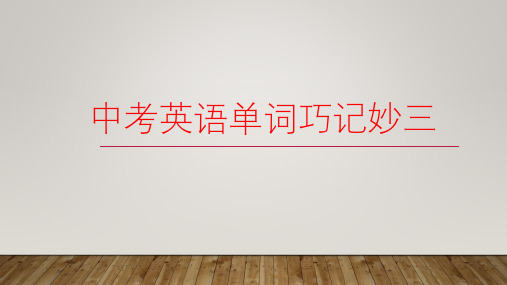
• Because of the toothache, he hasn’t enjoyed the
delicious dinner for several days so he has no choice but to ask the dentist for help.由于牙疼, 他已经好几天没有好好享受美味的餐点了, 所以他别无选择只能去看牙医。
我还 (记得), 团队 (成员), 数着 (数字)。
Remember, member, number
这样的 (争吵), 一直在 (继续)。 argue,continue
•污染 (减少), •停止 (生产), •只能 (引进,介绍)。 • reduce,produce,introduce
老师lead(领导) 开始read(阅读)。
• kind,mind,remind
•下定 (决心), •不看 (电视)。 • decision,television
• It is predicted that the number of readers will continue to reduce so the leader decided to stop selling this kind of magazine forever.
整成 (相似的), 非常 (流行的)。 Similar, popular
• 难道 • 贼在 • 却没
(失明的), (在背后), (发现)。
• blind,behind,find
• This blind Australian singer was very popular with teenagers and in yesterday's show, he sang his favorite songs while some actresses were dancing around him.
- 1、下载文档前请自行甄别文档内容的完整性,平台不提供额外的编辑、内容补充、找答案等附加服务。
- 2、"仅部分预览"的文档,不可在线预览部分如存在完整性等问题,可反馈申请退款(可完整预览的文档不适用该条件!)。
- 3、如文档侵犯您的权益,请联系客服反馈,我们会尽快为您处理(人工客服工作时间:9:00-18:30)。
中考英语词汇话题联想记忆
第30讲Some famous persons in the history of China
[词汇联想]
[短文助记]
In the long history of China, there are a number of famous people who influence others generation by generation. Confucius, a pioneer in the field of education, was a great thinker who had many wise ideas and thoughts about nature and human behavior. His main ideas are kindness and good manners. He was also a famous philosopher whose wise sayings have influenced many people in different countries. Zheng He was a Ming dynasty explorer whom the Chinese people are proud of. As a captain and palace official, he led seven ocean journeys from 1405 to 1433. he even sailed to the east coast of Africa. His last ocean journey was more than half a century earlier than Columbus’ journey to America. So he really is the pride of China. Sun Yat-sen who led the Xinhai Revolution in 1911 was the first president of the Republic of China. When he was in his thirties, he took an active part in the battle against the Qing dynasty. He became popular with overseas Chinese and Chinese students abroad. He and his men brought down the Qing dynasty and achieved the victory.。
